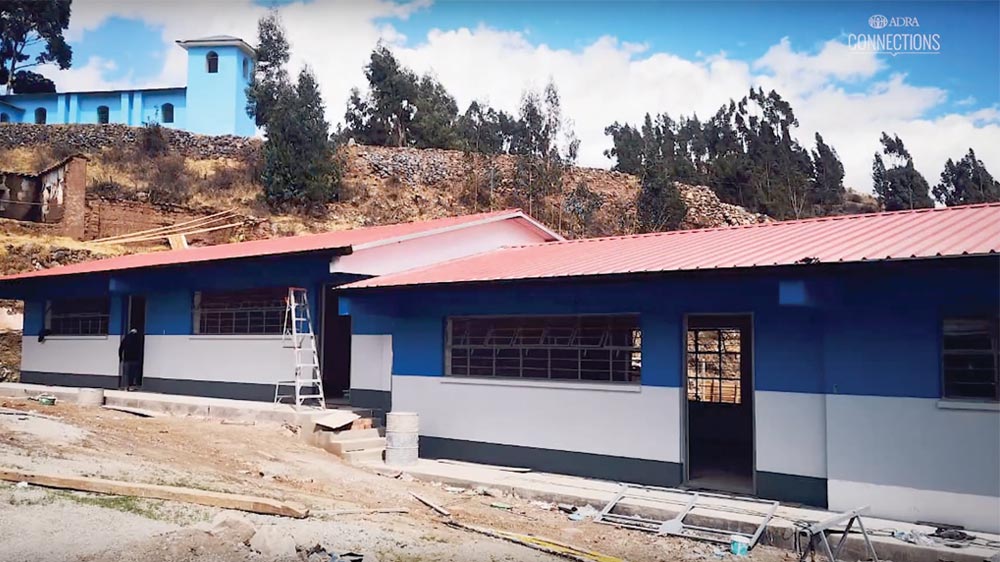Arrived safely. It’s cold!”
This is the first message I sent my family when my plane landed in Cusco, Peru. My friend Moala and I had just flown from New Zealand to participate in an ADRA Connections adventure. It was winter here, and at the altitude of 11,000 feet, Cusco felt freezing!
Outside the airport, Moala and I boarded a bus with a large group of volunteers whom we’d be camping and working alongside for two weeks. More than 70 of us had traveled from around the globe to build new classrooms for an elementary school in a mountain community.
 The Adventist Development and Relief Agency (ADRA) is the global humanitarian organization of the Seventh-day Adventist Church. Through an international network, ADRA delivers relief and development assistance to individuals in more than 118 countries—regardless of their ethnicity, political affiliation, or religious association.
The Adventist Development and Relief Agency (ADRA) is the global humanitarian organization of the Seventh-day Adventist Church. Through an international network, ADRA delivers relief and development assistance to individuals in more than 118 countries—regardless of their ethnicity, political affiliation, or religious association.
By partnering with communities, organizations, and governments, ADRA can improve the quality of life of millions through nine impact areas: social justice; disaster response; economic growth; children’s needs; gender equity; community health; water, sanitation, and hygiene issues; hunger and nutrition; and livelihoods and agriculture.
Thank you for supporting ADRA through your World Budget and mission offerings!
ADRA Connections
ADRA Connections is ADRA’s global volunteer program that allows service-minded individuals to experience its mission firsthand and make a difference in the communities they serve. For more information about ADRA or to participate in an upcoming trip, visit the ADRA Connections website at ADRAConnections.org.
Our bus wound its way through the Andes Mountains until it reached Camp Chuquicahuana. The camp, run by ADRA Peru, serves as a hub for a variety of humanitarian projects in the area. When we arrived, Moala and I were delighted to be given soft alpaca sweaters to keep us warm on chilly nights.
Morning came all too early for us weary, jetlagged travelers, but at six-thirty sharp, we enjoyed an inspiring worship time followed by a hearty breakfast. Then we boarded the bus to travel to the job site.
When we arrived, we met a team of local men who would be working alongside us and guiding us through the construction process. We put on hard hats, protective glasses, and work gloves and joined them in digging, mixing cement, and carting water and other materials. By the end of the first week, we were comparing blisters as badges of honor for our labor.
The work was tiring, but the excitement of being in a new place and knowing that we were making it possible for more children to get an education and have better opportunities in the future made each day meaningful and rewarding.
One of the workers of the local crew was Andreas. He told me that he had four children who had graduated from the school and one, named Susana, who was still attending. He had no professional training and needed to work multiple jobs to provide for his family.
Being able to work on the school was special for Andreas. He shared that while the hours were long and the work was draining, it was worth it all knowing that his daughter’s life will be better because she has an education.
Susana is 10 years old and enjoys playing with her friends. I had the opportunity to sit beside her in her classroom and listen to her read. “I am a very fast runner,” she told me, “and my favorite subject is communications.” Susana is very proud of her father, who is helping to improve her school.
For Susana, the new classrooms mean that she and her friends will be able to learn together. She believes that if she studies hard, she will be able to fulfill her dream of becoming a police officer. “That way, I’ll be able to keep my community safe,” she told me.
When I returned home from Peru, I told my family all about my adventures. I shared with them about the warmth I felt being in the room with Susana and Andreas and learning the ways they wanted to serve those around them.
This was a life-changing trip for my friends and me. As we spent time together in service and developed a deeper connection with the community, we were reminded of our call to bring what we have together and use it to serve others with love.
Andreas and Susana were examples of what happens when we look beyond ourselves. Andreas continues to serve his family, and Susana continues her education in hopes of one day serving her community.
 To watch ADRA mission stories, visit m360.tv/adra.
To watch ADRA mission stories, visit m360.tv/adra.
There is a Maori proverb in New Zealand, “Nā tō rourou, nā taku rourou ka ora ai te iwi,” which means, “With your basket and my basket, the people will thrive.” When we bring what we each have and use it together, we truly can make the world a better place.






